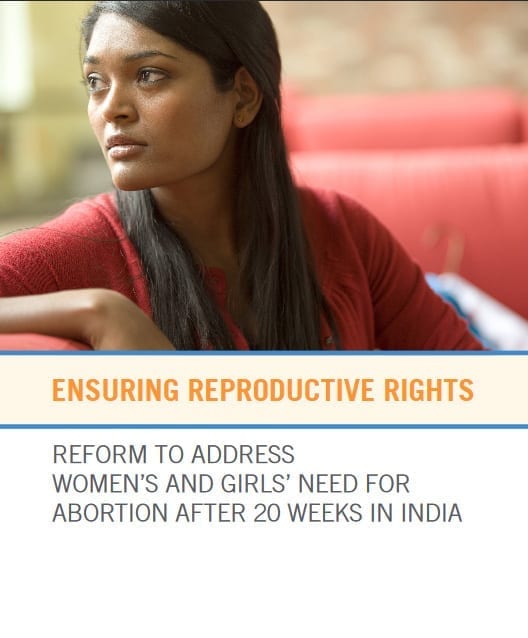India Passes Abortion Reform but Fails to Undo Barriers to Access
New amendment increases gestational limits but will expand third-party authorization for abortion care

This week, the Parliament of India passed an amendment to India’s 50-year-old abortion law that fails to remove barriers to access and instead creates new ones. Following Presidential assent, per procedure, the amendment will become law.
While increasing gestational limits, the amendment entrenches a harmful policy requiring women to obtain authorization by medical practitioners for all abortion care—even in the earliest stages of pregnancy—despite broad calls for its removal. And while the amendment increases some gestational limits, it institutionalizes third-party authorization for abortion care by adding a new requirement for approval from a three-person board of medical specialists in cases of severe fetal anomaly beyond 24 weeks.
“India has taken an important step in amending its 50-year-old abortion law. In a country where every day, approximately eight women die from complications related to unsafe abortion, the increase in gestational limits will ensure that more women are able to access safe and dignified abortion care,” said Enid Muthoni, Senior Vice president, Global Legal Program at the Center for Reproductive Rights in an issued statement. “However, more work is called for to expand access to sexual and reproductive health and rights in India in a non-discriminatory, truly rights-based and inclusive framework.”
Because of India’s inadequate number and skewed distribution of obstetricians and gynecologists, lack of facilities providing abortion care, equipment shortages, and inadequate health care infrastructure, authorization requirements could push abortion care out of reach for many throughout the country—especially women living in poverty, women in rural areas, and survivors of sexual assault.
The Center for Reproductive Rights is working closely with national partners to highlight the amendment’s implications for sexual and reproductive health and rights (SRHR) in India, providing human rights legal expertise, contributing technical support and resources, engaging in urgent advocacy actions, and amplifying the work of national partners.
The Center is a member of the Pratigya Campaign, a national coalition advocating for abortion rights in India. The Campaign has presented “Recommendations for a Progressive and Inclusive MTP Amendment Bill 2020” which outlines recommendations for reforming the law.
India’s current abortion law allows abortion during the first trimester with approval by a medical practitioner under specified conditions that include risk to health and life and sexual assault. In a welcome move, the new amendment to the Medical Termination of Pregnancy Act (MTP) of 1971 will increase some gestational periods: from 12 to 20 weeks with authorization by one medical practitioner; and from 20 to 24 weeks with authorization by two medical practitioners.
In cases involving a severe fetal anomaly, a three-person medical board, made up of a gynecologist, a pediatrician, and a radiologist, must confirm the diagnosis in order for a pregnant person to access care–a mandate that is difficult to fulfill in India, particularly in areas outside of major cities. The amendment includes an increase in the gestational limit for cases involving severe fetal anomalies beyond 24 weeks, but that increase does not extend to abortion access for survivors of sexual violence.
The Lower House of the Indian Parliament passed the measures in March of 2020. Following passage in the Upper House, the amendment will be sent to the President for assent to become law.
India’s amendment is written to apply only to pregnant women in specified circumstances and fails to address the needs of transgender people. This could adversely impact effective implementation of other Indian laws and court decisions, including a Supreme Court ruling on the rights of transgender people.
Reproductive Rights and Access in India
Under the current abortion law, approximately eight women in India die every day from complications related to unsafe abortion, the third leading cause of maternal mortality in the country. The new amendment to the MTP could further exacerbate existing barriers and make it even more difficult for people to access safe abortion care in India.
The Medical Termination of Pregnancy (MTP) Act of 1971 legalized abortion in India, creating a new legal standard intended to guard against the risks of unsafe abortion. Under the original MTP, abortion is legal up to 20 weeks to save a woman’s life or health and in cases of rape, contraceptive failure among married people, fetal anomaly, or economic and social necessity. The provisions of the MTP were expanded in 2002 and 2003 to include medication abortion.
Learn more:
-
The Center’s World Abortion Laws Map, a definitive record of the legal status of abortion in countries across the globe.
-
A June 2020 report by the Center on SRHR and Gender Issues in Asia During the COVID-19 Pandemic, including developments in India.
-
“Securing Reproductive Justice in India: A Casebook,” a report from the Center and the Centre for Constitutional Law, Policy, and Governance at the National Law University, Delhi.

